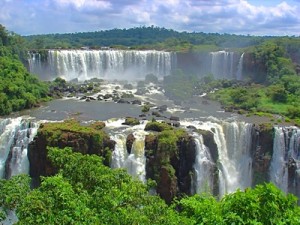Paraguay is located in South America and currently has a population of approximately 6.3 million. The primary religion is Catholic. It is considered to be one of the poorest and least developed countries on the continent with approximately 35% of its people living in abject poverty, but has some of the most beautiful terrain in the world. The government is democratic with three branches of government in a two-party system. The economy is basically market based with most activity coming from small businesses and street vendors.
 As with most culturally Spanish countries, Paraguay possesses a rich tradition in literature. That being said, it has never been an easy task getting books published and distributed in the country. Most renown authors were forced to seek publishers in more economically advanced South American countries such as Argentina, Brazil or Mexico.
As with most culturally Spanish countries, Paraguay possesses a rich tradition in literature. That being said, it has never been an easy task getting books published and distributed in the country. Most renown authors were forced to seek publishers in more economically advanced South American countries such as Argentina, Brazil or Mexico.
The most famous of the Paraguayan authors are Augusto Roa Bastos (1917-2005) , Gabriel Casaccia (1907-80), Juan Silvano Godoi (1850-1926), Hérib Campos Cervera (1905-1953) and Roque Vallejos (1943-2006).
Augusto Roa Bastos was a prominent Latin American writer and novelist. Most of his works were based on Paraguayan history and social issues. His political ideas forced him to be exiled and most of his works were actually crafted outside of the country. His most important work was Yo el Supremo and in 1989, he received the prestigious Premio Miguel de Cervantes award.
Gabriel Casaccia is considered the father of modern literature in Paraguay. He studied law at the Universidad Nacional de Asuncion and upon graduation, he set out to be a journalist. He wrote for several local magazines and began writing fiction. His most popular works included novels like Hombres y Mujeres Fantoches (1930), La Babosa (1952), La Llaga (1963) and Los Huertas (1981), published after his death. He also wrote short stories and a play.
Juan Silvano Godoi was a very prominent political figure in postwar Paraguay during the mid 1800s. As a teenager, he studied in Argentina only to return to Paraguay after the war and began trying to help rebuild the country. His political career was corrupt in nature eventually leading to exile after his involvement in the assassination of a political adversary. He was considered a polemic journalist and penned works such as Monografías históricas and La muerte del Mariscal López.
Hérib Campos Cervera was one of Paraguay’s most important poets. His ideology leaned towards the left and was clearly derived from socialist and Marxist beliefs. Because of his beliefs, he found himself in exile on more than one occasion as he was often an outspoken opponent of the authoritarian government. He only published one book of poetry, Ceniza redimida (1950) while a second book called Hombre secreto was published after his death.
Roque Vallejos began his career as forensic surgeon in the High Court of Justice. His contribution to literature in Paraguay came as a poet and essayist. He was part of a renown group called 60 generation which focused it’s writings on social and political issues. His best works were Los arcángeles ebrios (1964) and Tiempo baldío (1988).
As you can see, although Paraquay is a small country and considered a very poor country overall, it has still managed to produce some great writers throughout history. As we become a more global society and technology and resources become available to people around the world, I believe that much more literature will be forthcoming.




